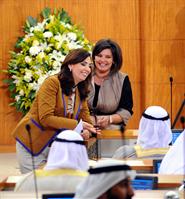Date : 31/05/2009

KUWAIT, May 31 (KUNA) -- The United Nations Development Programme (UNDP) supported efforts to maximize chances of Kuwaiti women to exercise their political rights, Acting UNDP-Kuwait Resident Representative Mohamed Naciri said Sunday.
"Throughout the past three years; and in collaboration with the government, UNDP and UNIFEM have teamed up with civil society organizations and women activist groups to train women on voting procedures, and to change attitudes towards women's political activity as a legal right that is in line with Islamic jurisprudence," Naciri noted in a press release here today. The UNDP initiated an expanded women's political participation project in 2008 to conduct a post-election evaluation of impediments facing women candidates, he said.
The evaluation was carried out by Dr. Salwa Al-Jassar, one of the four newly elected female parliamentarians, sworn today.
" In many countries it has taken around 50 years for women to successfully get elected to parliament after they had gained the right to vote," Al-Jassar was quoted by the press release as saying. " It has taken us 70 women candidates in three rounds of elections over four years to gain 8 percent of the seats of the parliament," she added.
Women did not need affirmative action or an electoral quota, Al-Jassar said, adding "we did it with persistence and systematic voter education and awareness." "This is a very promising achievement ... not only for Kuwaiti women but for all women in the Gulf and the entire Arab World," Al-Jassar concluded.
The National Assembly convened Sunday for its first session after the last elections, of which women occupied four out of 50 member seats, as the first elected female representatives in the history of the oldest parliament in a Gulf Arab state.
None of the 54 women who stood for election in 2006 and 2008 made it, but four out of the 16 women candidates running in two out of five electoral constituencies came on top of the polls. (end) mar KUNA 311143 May 09NNNN